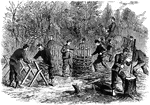Clipart tagged: ‘breastworks’

77th Pennsylvania Regiment
"Captain Muller's Battery Company of the Seventy-seventh Pennsylvania Regiment making fascines and gabions…

"Captain Muller's Battery Company of the Seventy-seventh Pennsylvania Regiment making fascines and gabions…